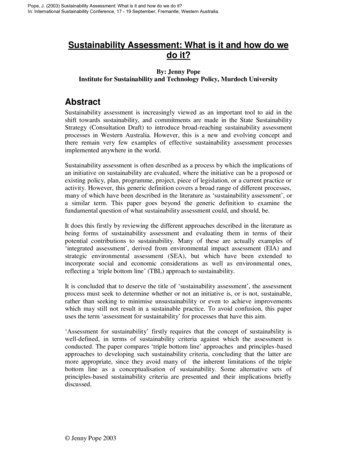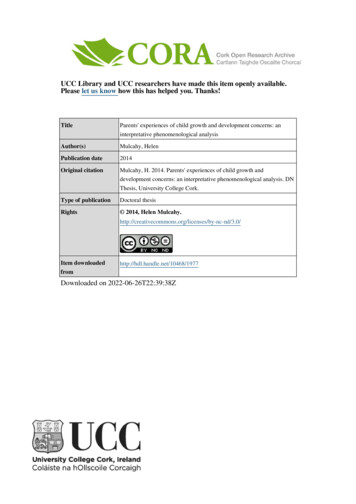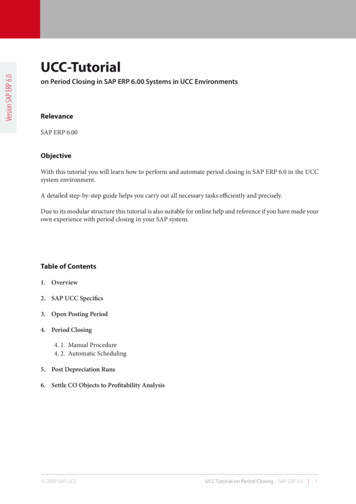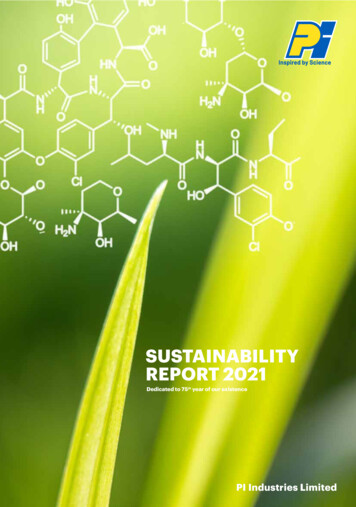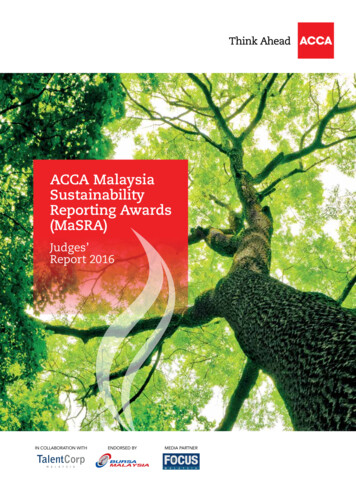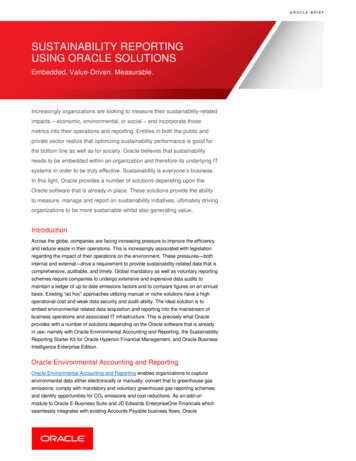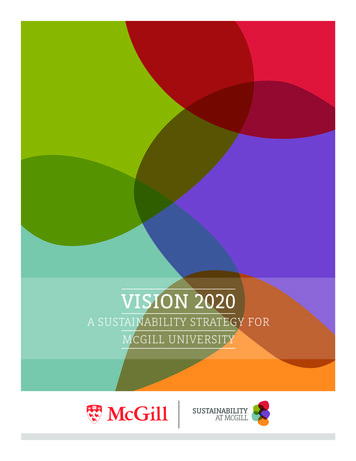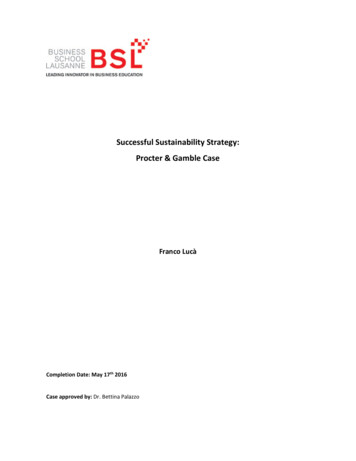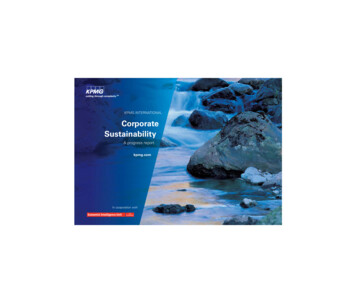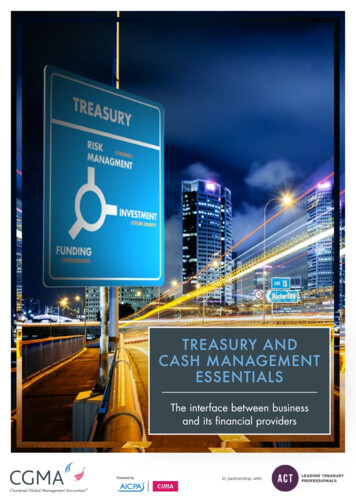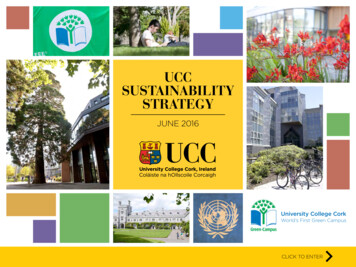
Transcription
UCCSUSTAINABILITYSTRATEGYJUNE 2016University College CorkWorld’s First Green CampusCLICK TO ENTER
UCC SUSTAINABILITY STRATEGYTable of Contents1.0Introduction and Context22.0Background, Structure and gic Goal67.0 Overarching Objectives of theUCC Sustainability Strategy78.0 Key Areas for Implementationof the Sustainability Strategy8Sustainability CitizenshipStrategic Aims:Objectives:Performance 38.3.18.3.28.3.3Teaching and LearningStrategic Aims:Objectives:Performance indicators:ResearchStrategic Aims:Objectives:Performance indicators:88.48.4.18.4.28.4.3Food, Health and Well-beingStrategic Aims:Objectives:Performance indicators:8.58.5.18.5.28.5.3Landscape, Heritage and Natural ResourcesStrategic Aim:Objectives:Performance indicators:8.68.6.18.6.28.6.3Recycling and Waste ManagementStrategic Aims:Objectives:Performance indicators:8.78.7.18.7.28.7.3Energy, Water and Climate ChangeStrategic Aims:Objectives:Performance indicators:168.88.8.18.8.28.8.3Procurement and ContractsStrategic Aims:Objectives:Performance indicators:188.98.9.18.9.28.9.3Commuting and Business TravelStrategic Aims:Objectives:Performance 910101010191920201111CONTENTSBACKFORWARD1
UCC SUSTAINABILITY STRATEGY1.0 Introduction and ContextFounded in 1845, University College Cork – National University of Ireland, Cork(UCC) is one of four constituent universities of the federal National University ofIreland. UCC is a leading Irish educational and research institution: University ofthe year four times in recent years (2003, 2005, 2011 and 2016), with a researchincome that is consistently one of the highest in the country. UCC has 20,700students, 2,800 staff (UCC 2011) and an annual income of ca. 290 million.UCC along with local and regional government, the business community, civilsociety and other important institutions – is a major stakeholder in the long termsustainable development of the city, the county and the region. As a leadinghigher education institution, as a major research institute, as an employer, asa landowner, as a holder of significant cultural and heritage assets, and as apartner in civic and commercial life, UCC is in a unique position to take an ethicalleadership role in achieving sustainability and resilience in Ireland and beyond. Infulfilling all of these roles, UCC will play its part in advocating for best practice indecision-making for the common good.Over the past number of years UCC has expended considerable efforts inaddressing its environmental performance and has become a sectoral leaderin sustainability. These efforts have been recognised both nationally andinternationally (see Box 1). The next logical step in the process is the extensionof the environmental policy to a more comprehensive sustainability strategy.UCC is rightly regarded as Ireland’s ‘Green University’ and in combinationwith the University’s Strategic Plan 2013-2017 the implementation of thisSustainability Strategy will further enhance this reputation and performance.Sustainability and care for the environment are evident throughout theUniversity curriculum with relevant subjects taught across a range of academicdisciplines, including: civil engineering, energy engineering, chemical sciences,biological sciences, environmental science, geography, spatial planning, geology,sociology, medicine, law and philosophy. Complementary to and parallel with thisteaching, UCC has substantial and varied research activities on environmentaland sustainability related issues in all of its colleges and schools. Of particularnote in this regard are a number of the University’s flagship institutes e.g., theEnvironmental Research Institute, Institute for Social Science in the 21st Century,National Tyndall Institute, the APC Microbiome Institute, and more1.Accordingly, UCC has a strong commitment, in keeping with its role inenvironmental teaching and education, to reducing its environmental impacts.This has been addressed in recent years through the development andimplementation of a documented Environmental Policy committing UCC toimproving its environmental performance and forming the framework forenvironmental management on campus. This includes the strategies andinitiatives on: energy efficiency; waste and recycling; procurement; commuterplanning; infrastructure and estate management; education and ONTENTSBACKFORWARD2
UCC SUSTAINABILITY STRATEGYBOX 1: NATIONAL & INTERNATIONAL RECOGNITION FOR UCC’S GREEN ACHIEVEMENTS & SUSTAINABILITY PARTNERSHIPS (NOT EXHAUSTIVE)UI Green MetricsUCC in the top five in UI GreenMetric World University Rankings since 2012. http://greenmetric.ui.ac.id/An Taisce & FEE GlobalFirst University to receive the Green Flag award of the Foundation for Environmental Education (FEE)(in conjunction with An Taisce, Irish operator of FEE projects) making it Ireland’s first Green Campus.www.fee.global/ www.greencampusireland.org/ www.ucc.ie/en/greencampus/ISOFirst University to be awarded ISO 50001 accreditation for its energy management system 2011.Winner Green School/College Award, Irish ‘Green Awards’ 2011, 2012.Green Awards for Business andSustainabilityWinner Green Travel Initiative Award, Irish ‘Green Awards 2012.LAMAWinner of Irish Local Authority Members Association Award for Best Energy Efficiency Project in 2013. http://lamaawards.org/UNFCCCHolds observer status at UN Framework Convention on Climate Change (UNFCCC).ULSFSignatory to the Talloires Declaration – University Leaders for a Sustainable Future. www.ulsf.org/programs talloires.htmlGUPESSignatory to GUPES - Global Universities Partnership on Environment and Sustainability. SUNEP/GEMS Water programme. www.unep.org/gemswater/CONTENTSBACKFORWARD3
UCC SUSTAINABILITY STRATEGY2.0 Background, Structure and ResourcesIn September 2015, the United Nations General Assembly passed a resolutionwhich formally adopted 17 Sustainable Development Goals as summarised ingraphical form in Figure 1 (right). As a global University, University College Corkis fully cognisant of the contribution it can make to the realisation of these goals.Notwithstanding that all staff and students of the University should takepersonal responsibility for the impacts of their actions, the majority of activitiesof the University that impact on sustainability, are directed and influenced byand/or fall under the responsibility of a number of key actors and key functionalareas in the University. These include key actors in teaching and learning,research, operations, ancillary activities, and engagement with the widercommunity. See Table 1 (page 5) for an overview of potential key actors andresponsibilities against sustainability goals which would facilitate implementationof the sustainability strategy.As the majority of activities of the University that impact on the environment(a significant element of sustainability management) are currently theresponsibility of the Buildings and Estates Office (e.g., energy, utilities, wastemanagement, commuting, etc.) the B&EO take responsibility and leadershipin managing UCC’s environmental impact. Accordingly, overall managementresponsibility for sustainability, by extension, within University College Corkcurrently rests with the Director of Buildings and Estates, who reports to theUniversity Management Team and to the Governing Body as appropriate.A sustainability management group, comprising key technical personnel, isconvened as required to facilitate the day-to-day sustainability management.Sustainability aspects of activities under the direct control of the B&EO arecontrolled through the development and implementation of the appropriatepolicies, procedures and plans.The Heads of each College, School and Administrative Unit are responsible forensuring that the activities within their area of responsibility are performedin accordance with the current University Environmental Policy. This will beextended to responsibility for relevant areas of sustainability management.A Green Campus Committee, comprised of students and staff has been inoperation since prior to the awarding of the first An Taisce Green Flag in 2010,Figure 1: UN Sustainable Development Goals (SDGs)primarily to engage the student body in ‘greening the campus’ in associationwith the related activities of Buildings and Estates in relation to environmentalmanagement.In addition UCC established a Green Campus Forum, which is co-chaired bythe current Vice President for Teaching and Learning, and the Director ofBuildings and Estates, to allow for and facilitate the further engagement of theuniversity community in driving the sustainability agenda. In the Green CampusCommittee and Green Campus Forum, students and staff (both academic andadministrative) come together to discuss and initiate sustainability initiativesand projects, including: information, awareness raising, teaching and operationalmeasures concerned with Energy, Waste and Recycling, Water, Travel andCommuting, Biodiversity and other areas of relevance. In this way, the widerUniversity community can and do participate in driving the sustainability agenda.The effective implementation of a coherent Sustainability Strategy would benefitfrom the clear designation of persons and areas of responsibility in relationto key sustainability goals. As part of the development of the SustainabilityStrategy the operation and interaction of Committee, Forum, and key personnelwill be streamlined for effective implementation.CONTENTSBACKFORWARD4
UCC SUSTAINABILITY STRATEGYTable 1: Suggested Key and Responsible Personnel in Relation to Sustainability Management in UCCKEY PERSONNEL (NOT EXHAUSTIVE)OVERALL RESPONSIBILITYAll personnel; from President to studentsUniversity Management Team viaGreen Campus ForumTo engage our student body, staff andwider community in becoming activecitizens for sustainabilityOffice of the VP for Teaching & Learning; Office of StudentExperience; Office of Staff Welfare & Development; StudentsUnion; Green Campus Forum; Heads of Colleges & AcademicsUnits (colleges/department/institute/research groups);Representatives of e.g. Community-Academic Research Linksinitiative, CACSSS Community Engagement, & outreach stafffrom across universityVP for Teaching & LearningTo facilitate the development andempowerment of future leaders insustainability through our research,teaching and learning activitiesOffice of the VP for Research & Innovation; Office of the VPfor Teaching & Learning; Green Campus Forum; Heads ofColleges & Academics Units (colleges/department/institute/research groups); Key Administrative Staff; Students UnionVP for Research and Innovation;VP for Teaching & LearningTo minimise the local, regional and globalenvironmental impacts of our educational,research, operations and infrastructuraldevelopmentOffice of Buildings and Estates (including Estates Manager,Commuter Plan Manager, Energy Manager); Procurement &Contracts Manager; Green Campus Forum; Heads of Colleges& Academics Units (colleges/department/institute/researchgroups); Key Administrative Staff; Students UnionDirector of Buildings andEstates; Procurement &Contracts ManagerTo enhance the health and well-being of theUniversity and wider community throughthe facilitation and promotion of healthyeating and living as an integral part ofsustainable livingOffice of Student Experience; Director of Student Health& Wellbeing; Office of Staff Welfare & Development; GreenCampus Forum; Heads of Colleges & Academics Units(colleges/department/institute/research groups); KeyAdministrative Staff; Office of the VP for Teaching & Learning;Office of the VP for Research & Innovation; Students UnionHead of Student ExperienceTo promote and engage in the sustainableuse and management of the landscape andnatural resources of the University, in all itscampus areas, with respect to ecosystemservices, natural and cultural heritageOffice of Buildings & Estates; Green Campus Forum; School ofBiological, Earth and Environmental Sciences; EnvironmentalResearch Institute; Heads of Colleges & Academics Units(colleges/department/institute/research groups); KeyAdministrative staff; Students UnionEstates ManagerTo be an overall positive force in the journeytowards creating a sustainable world for allAll personnel; from President to studentUniversity Management Team viaGreen Campus ForumOverall Sustainability ManagementSUSTAINABILITY GOALSCONTENTSBACKFORWARD5
UCC SUSTAINABILITY STRATEGY3.0 Vision4.0 MissionTo be a world-class University leading the drive towards sustainability in HigherEducation Institutes and beyond, to our community, region and planet.To facilitate the development and empowerment of future leaders insustainability through our research, teaching and learning activities;When we refer to sustainability we refer to those social, environmentaland economic principles which allow us to create and live in a societywhich meets the needs of the present without compromising theability of future generations to meet their own needs*; that lead ustowards a thriving, equitable and ecologically healthy world** for all.To engage our student body, staff and wider community in becoming activecitizens for sustainability;To minimise the local, regional and global environmental impacts of oureducational, research, and ancillary operations, and infrastructural development;To enhance the health and well-being of the University and wider communitythrough the facilitation and promotion of healthy eating and living as an integralpart of sustainable living;To be an overall positive force in the journey towards creating a sustainableworld for all.5.0 ValuesOur values mirror those of the University strategic plan; leadership, excellence,accountability, collaboration, integrity, innovation and diversity. We add to thisthe value of stewardship, in our role as educators, leaders, and agents in thejourney towards sustainability.6.0 Strategic GoalOur key strategic goal is to increase the sustainability of the Universitythrough the embedding of sustainability goals and targets into all aspectsof the University’s educational, research, ancillary operations, infrastructuraldevelopments and interactions with the community. And by doing so tomaintain and improve our position as one of the leading green universities inIreland and the world.* Brundtland G et al (1987) Our Common Future: Report of the 1987 World Commission on Environment and Development** The Association for the Advancement of Sustainability in Higher Education www.aashe.org/CONTENTSBACKFORWARD6
UCC SUSTAINABILITY STRATEGY7.0 Overarching Objectives of the UCC Sustainability StrategyUniversity College Cork is firmly committed to the principles ofsustainability. Recognising that our activities impact upon theenvironment, society and economy through our education, researchand operations, our infrastructural development and our influence onthe wider community of which we are a part; we are cognisant of ourresponsibilities in local, national and global terms.We will endeavour to implement a measured and documentedprogramme of continuous improvement towards sustainability inall our activities as detailed below in key areas and in relation toachieving our stated mission, vision and strategic goals. Provide for continuous improvement for sustainability in all University activities; Identify strategic aims, objectives and measurements of performance in eachkey area that they are relevant and allow for meaningful comparisons overtime and across other normalised University metrics such as (a) building grossinternal floor area m2; (b) number of student full time equivalents (FTE); and (c)number of staff FTE etc.; Continue the University’s contribution to advancing the sustainability agendanationally and within academic discourse; Play a key role in the societal transition to sustainability through teaching,creating future sustainability leaders and generating new knowledge tofacilitate and support a more sustainable future; Engage with local, national and international groups and stakeholders tocontribute to more sustainable communities; Plan for integration of sustainability into all University strategies, plans andpolicies as they come up for renewal; Actively promote the University, internally and externally, as Ireland’s ‘GreenUniversity’.The Sustainability Strategy can only be effectively implementedwith the support and efforts of staff, students, contractors and otherstakeholders, who will be kept informed of sustainability matters andinitiatives and encouraged to engage in active involvement at all levels. Cultivate a sustainability culture within the University that is student led,research informed and practice focused; Foster sustainability citizenship among the University Community; Facilitate participation of all the University community in sustainability initiatives; Inform and raise awareness in all stakeholders (e.g., staff, students, contractors,visitors) of sustainability issues and the relationship to their own activities; Make the Sustainability Strategy and other relevant information available tothe public;CONTENTSBACKFORWARD7
UCC SUSTAINABILITY STRATEGY8.0 Key Areas for Implementation of the Sustainability Strategy8.1 Sustainability Citizenship8.1.2 Objectives:The University is cognisant that each of us, individually, is an integral part ofthe wider environment and accordingly should act as good citizens of Earth.This University commits to support and promote such sustainability citizenshipamongst its student and staff population.UCC is proud to have been the first University in the world to receive the An TaisceGreen Campus award, and the University sees the Green Campus programme as asignificant component of its sustainability efforts. The University strives to promotesustainability citizenship through its Green Campus programme in a manner thatis student-led, research informed and practice focused. Furthering the promotionof sustainability citizenship beyond the Green Campus programme and through allaspects of University life is key to the full implementation of the sustainability strategy.SUSTAINABILITYGOALTo engage ourstudent body,staff and widercommunity inbecoming activecitizens forsustainabilityKEY PERSONNEL(NOT EXHAUSTIVE)Office of the VP for Teaching & Learning;Office of Student Experience; Office ofStaff Welfare & Development; StudentsUnion; Green Campus Forum; Heads ofColleges & Academics Units (colleges/department/institute/research groups);Representatives of e.g. CommunityAcademic Research Links initiative,CACSSS Community Engagement, &outreach staff from across universityOVERALLRESPONSIBILITY To increase awareness and facilitate greater engagement of the University’sstudents and staff on sustainability issues; To encourage, support and promote initiatives for students and staff to takeresponsible environmental and sustainability actions through behavioural andpractice change; To retain the University’s ‘Green Flag’ and maintain its position as a leader inthe Green Campus community; To maintain and improve the University’s position in the world Green Metricsand/or other sustainability rankings systems for Higher Level Institutes; To facilitate and support voluntary student and staff environmental andsustainability relevant organisations and initiatives; To further engage with the Students Union, the Societies Guild and individualsocieties around this issue.8.1.3 Performance will be measured using the following indicators: Number of students and/or staff involved in Green Campus initiatives;VP for Teaching &Learning Campus awareness of UCC sustainability initiatives; Number of student organisations/societies on-campus relating to sustainability; Number of staff organisations/societies on-campus relating to sustainability; Number of students and staff involved in such sustainability relevant organisations; Number of students and staff involved in off-campus organisations thatengage in sustainability relevant activities;8.1.1 Strategic Aims: To engage our student body, staff and wider community in becomingactive citizens for sustainability, and establish sustainability citizenship as acentral component of the University ethos – with students and staff givinga commitment to learning more about sustainability and taking responsibleaction. Overall participation in sustainability initiatives, activities and societies as % ofstaff and student FTE figures; Green flag status; Status in the Green metrics and/or other green/sustainability rankings measures; Any relevant recognised awards/achievements in sustainability citizenship bystudents and staff.CONTENTSBACKFORWARD8
UCC SUSTAINABILITY STRATEGY8.2 Teaching and LearningSustainability issues are reflected throughout the University’s undergraduate andpostgraduate education programmes, both within traditional environmentallyfocussed fields such as science and engineering and increasingly in otherdisciplines (literally from A to Z – Archaeology to Zoology). Increasing thenumber and quality of courses in which sustainability issues are featured is afocus area of the Office of Teaching and Learning, and is used as a performanceindicator for the calculation of numerous Green rankings systems. In additionthe University wide module on Sustainability taught by a range of staff fromacross various disciplines and colleges in the University is available to studentsof all programmes. As well as formal environmental education there aresignificant opportunities for UCC students to engage in informal sustainabilityeducation through membership of student organisations such as EnvironmentalSociety and the Green Campus initiative, fully supported by the University.Building on this performance through further engagement with Teaching andLearning activities is ongoing. Over 35 courses relating to sustainability areoffered by the university. Events such as Bioblitz and engagement in culturenight provide an opportunity to use event based pedagogy in teaching andlearning in sustainability at UCC. Over 35 conferences and seminars are held onsustainability across the rich breadth of programmes on sustainability in almostall schools and departments.SUSTAINABILITYGOALKEY PERSONNEL(NOT EXHAUSTIVE)OVERALLRESPONSIBILITYTo engage ourstudent body,staff and widercommunity inbecoming activecitizens forsustainabilityOffice of the VP for Teaching & Learning;Office of Student Experience; Office ofStaff Welfare & Development; StudentsUnion; Green Campus Forum; Heads ofColleges & Academics Units (colleges/department/institute/research groups);Representatives of e.g. CommunityAcademic Research Links initiative,CACSSS Community Engagement, &outreach staff from across universityVP for Teaching &LearningTo facilitate thedevelopment andempowermentof future leadersin sustainabilitythrough ourteaching andlearning activitiesOffice of the VP for Research &Innovation; Office of the VP forTeaching & Learning; Green CampusForum; Heads of Colleges & AcademicsUnits (colleges/department/institute/research groups); Key AdministrativeStaff; Students UnionVP for Teaching &Learning8.2.1 Strategic Aims: To foster a culture of sustainability citizenship within the University Communitythrough both formal and informal teaching and learning opportunities andactivities; To facilitate the development and empowerment of future leaders insustainability through our teaching and learning programmes and activities.CONTENTSBACKFORWARD9
UCC SUSTAINABILITY STRATEGY8.2.2 Objectives:8.3 Research To understand and document the environmental or sustainability content ofcurrent academic programmes and curriculum;University College Cork is one of Ireland’s leading research intensive Universitiesand has an active research community working on multiple aspects ofsustainability. UCC’s sustainability researchers can be found throughout theUniversity’s four colleges (Arts, Celtic Studies and Social Science; Business andLaw; Medicine and Health; and Science, Engineering and Food Science) working inthe constituent schools, associated research centres and through multidisciplinaryinstitutes and SFI centres2 such as the Environmental Research Institute (ERI),Institute for Social Sciences in the 21st century (ISS21), Tyndall National Institute,MaREI Institute, APC Microbiome Institute and more. In excess of 20M is securedannually for environmental and sustainability research, with hundreds of researchpapers, patents and some commercial applications/translation each year. To promote, increase and raise awareness of current programmes withenvironmental or sustainability content across all four colleges; To encourage the active participation in non-formal sustainability education inparticular the Green Campus initiative; To encourage and support the development of sustainability literacy withinteaching and learning; To capitalise on the diverse nature of student population to increase students’knowledge of global sustainability issues; Where appropriate, sustainability to be taken into account in discussionsleading to course approval.8.2.3 Performance will be measured using the following indicators: Number of sustainability relevant education programmes; Proportion of students on sustainability relevant education programmes; Proportion of ‘other’ students taking sustainability relevant modules;Transdisciplinarity on sustainability research is facilitated and encouraged throughinitiatives such as the Environmental Citizenship Research Priority Area supportedthrough the Office of the Vice President for Research and Innovation. TheUniversity continues to win significant funding for sustainability research from EUresearch programmes, national agencies and through collaboration with industry.SUSTAINABILITYGOALTo facilitate thedevelopment andempowermentof future leadersin sustainabilitythrough ourresearch activitiesKEY PERSONNEL(NOT EXHAUSTIVE)OVERALLRESPONSIBILITYOffice of the VP for Research &Innovation; Office of the VP forTeaching & Learning; Green CampusForum; Heads of Colleges & AcademicsUnits (colleges/department/institute/research groups); Key AdministrativeStaff; Students UnionVP for Research andInnovation Participation by members of the public and other stakeholders in courses withsustainability content; Detail other opportunities/awards for achievement/leadership/engagement inrelation to teaching and learning of sustainability.8.3.1 Strategic Aims: To facilitate the development and empowerment of future leaders insustainability through our research activities; To maintain and enhance the University’s standing in research on utes/2CONTENTSBACKFORWARD10
UCC SUSTAINABILITY STRATEGY8.3.2 Objectives:8.4 Food, Health and Well-being To encourage research and innovation in the sustainability area;University College Cork takes the view that the health and wellbeing of its staffand students are fundamental to achieving its mission. Students who are in goodhealth, content and self-confident will be best placed to realise their academicpotential during their time at UCC. In addition, if staff are healthy and happy intheir workplace they are more productive, which will create a more effectivescholarly environment. The University has been awarded formal recognition bythe HSE South for its efforts in Health Promotion and Improvement, under theumbrella of the UCC Health Matters initiative. In addition a considerable numberof sustainable food initiatives have been developed and promoted from withinUCC, which positively impact both the University population and the widercommunity e.g. the Cork Food Policy Council3, and the developments towardssustainable food provision on campus by the current main on-site cateringcontractor, KSG4. To promote and facilitate transdisciplinarity in sustainability research; To encourage and promote networking on sustainability across the University’scolleges; To continue and enhance the strong links between University operational unitsand academic and research units; To encourage researchers in sustainability domains to make greater use of theUniversity’s infrastructure and community for research; To capture and record details of University research projects withenvironmental or sustainability objectives; To promote, increase and raise awareness of current research that deliversenvironmental or sustainability objectives across all four colleges.8.3.3 Performance will be measured using the following indicators: Research funding for sustainability related research; Proportion of total research income related to sustainability; Number of sustainability related research projects; Number of sustainability researchers; Number of publications on sustainability and environment (average per year); Scholarly events related to sustainability and environmental research; Number of internal interdisciplinary and transdisciplinary collaborations;The University considers that its food, health and wellbeing initiatives areintegrally linked with achieving its sustainability objectives and sees manysynergies e.g., promotion of walking or cycling as commuting options,encouraging local sustainable and healthy food options, growing of food oncampus, etc. Further development of integration and promotional opportunitiesaround food, health, well-being and sustainability will be a key focus of theSustainability Strategy.SUSTAINABILITYGOALKEY PERSONNEL(NOT EXHAUSTIVE)To enhance thehealth and wellbeing of theUniversity and widercommunity throughthe facilitationand promotion ofhealthy eating andliving as an integralpart of sustainablelivingOffice of Student Experience; Directorof Student Heal
ierstrsy Univ eConCl 1 UnnivUverstrys seCiveorelgC 1.0 Introduction and Context 2 2.0 Background, Structure and Resources 4 3.0 Vision 6 4.0 Mission 6 5.0 Values 6 6.0 Strategic Goal 6 7.0 Overarching Objectives of the 7 UCC Sustainability Strategy 8.0 8Key Areas for Implementation of the Sustainability Strategy 8.1 8 Sustainability Citizenship 8.1.1 Strategic Aims: 8 8.1.2 Objectives: 8
